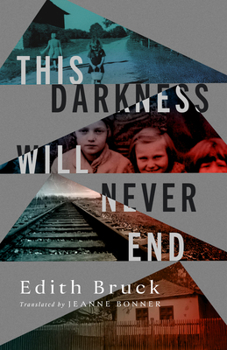This Darkness Will Never End
The stunning short story collection--available in English for the first time--that established Edith Bruck as a major figure in Italian literature.
This Darkness Will Never End, the first short story collection by the Hungarian-born author Edith Bruck, was published to acclaim in Italy in 1962. After World War II, Bruck, a Holocaust survivor, settled in Rome where she wrote her fable-like stories, recounting the lives of poor Jewish families in Europe before, during, and immediately following the war.
In the title story, believed by some film scholars to have inspired the Oscar-winning movie Life Is Beautiful, a young girl shepherds her blind, sickly brother as they are deported. In "Matzoh Bread," a child gets a painful glimpse of anti-Semitism when a friend tells her a legend about the unleavened bread Jews eat at Passover. In one of the more colorful stories, a hapless father whose business partners swindle him over a horse only tells the truth when he's talking in his sleep.
Beautifully translated from the Italian by Jeanne Bonner, these stories offer a glimpse into a bygone world. They testify to the resilience of survivors like Bruck, whom Italian critics initially compared to Anne Frank, deeming her the writer Anne would have become had she survived.
"This Darkness Will Never End subtly draws us into the complex emotional world of growing up in wartime. These are finely wrought, meticulously translated stories about living through both everyday and extraordinary hardship--Bruck, unsparing and insightful, is a major Jewish voice."
--Jamie Richards, winner of the National Translation Award in Prose, and translator of Adua by Igiaba Scego
"The gifted translator Jeanne Bonner has done a great service by bringing us these extraordinary stories by the Hungarian writer Edith Bruck, a Holocaust survivor who lived in Rome after the war; she offers vivid and poignant stories about the experiences of Jewish families whose lives were overturned during the war. Bruck's book is a splendid and vital addition to the body of Holocaust literature by women."
--Lynne Sharon Schwartz, author of Disturbances in the Field





